- Home
- J. A. Konrath
Shot of Tequila Page 3
Shot of Tequila Read online
Page 3
Leman laughed. “They don’t know we’re in here.”
“Huh?”
“Take a look, muscle-head. They aren’t even armed. They don’t know we’re in here. They think they can just break in, take the money, and go.”
“So what do we do?”
“We just wait on either side of the doorway, and when they get in, we take them out.” Leman laughed again. “Stupid amateurs.”
“Alive, right? We’re not gonna kill them, are we, Leman?”
For someone so goddamn big who made a living breaking people’s bones, Matisse could be a real pussy.
“Naw. We’ll just bring them to Marty. He’ll take care of it.”
“Yeah. Good idea. Marty will know what to do with them.”
Torture them and kill them, Leman thought. Not smart trying to steal from Marty the Maniac.
Leman didn’t like his boss. He didn’t like the endless stupid lectures. He didn’t like the way Marty tried to pretend they were buddies, even while abusing them. The work was okay, but Marty insisted on a minimum sixty hour work week, and even demanded they punch a clock.
But the money was unbelievable. Sure, he was hourly, but Leman figured out that with bonuses, he averaged about thirty bucks an hour. That was eighteen hundred bucks a week, cash. A big step up from the six bills a week he was making as a member of Chicago’s finest. Plus it was a lot less dangerous than breaking up gang fights or investigating shots fired at a housing project. In five years, Leman figured he could retire. Move out to the tropics and sip drinks out of coconuts while native girls blew him.
Five minutes later, the amateurs had managed to drill a hole through the door the width of a finger. Leman had everyone be quiet and move against the wall on either side of the doorway, where they wouldn’t be seen when the burglars entered. Then he turned the monitor toward him so he could watch their progress.
But instead of trying to open the door, the burglars kicked a large wedge under it. Then the short one pushed a long tube through the hole he’d made.
“What’s that?” Matisse asked.
Leman told him to shut up, watching as they hooked the other end of the tube up to a nozzle on the keg.
Leman frowned and said, “Gas.”
“What?”
“Gas! I was wrong. They know we’re in here. They’re gassing us.”
“What do we do?”
“Cover up the hose!”
Matisse backed away. “You cover up the hose!”
A faint hiss came from the tube, and Leman took a deep breath and plugged up the end of it with his thumb. The hissing continued. He stared at the tube and saw that the two feet of hose hanging into the room was perforated with hundreds of tiny holes.
“Help me seal up the tube! There are too many holes!”
Matisse and one of the accountants put their hands on the tube, trying to cover up all the holes. The other accountant sat in a corner and hugged his knees, trying to make himself very small, which was a trick he learned in Kindergarten.
“It’s still coming through!” Leman said through clenched teeth.
“What do we do?” Matisse’s eyes were wide with panic. Leman took out his pocket knife and tried sawing at the tube. The hose was made of some material that didn’t cut.
“I’m feeling funny,” one of the accountants said.
Leman noted that he was feeling strange too. Though he was trying to hold his breath and take in good air over his shoulder, some of the gas was obviously getting to him. He was lightheaded, and it would only get worse.
Leman looked around for the air vent. Maybe he could survive by breathing the air coming in. He saw it in the far corner of the room, near the ceiling. Though he hadn’t noticed during the past two hours he’d been in the room, the vent had a piece of sheet metal covering it up, screwed into place.
Matisse saw it at the same time.
“I told you it was cold! They cut off our air!”
“Shut up!”
“We’re going to die!”
“Shut up!”
Matisse threw up on the floor. Leman, becoming dizzy, held his .38 up to the point of the hose that met the door. He tried to angle it so he just shot the hose off. Then they could shove something in the hole and stop the gas. Or maybe he could even shoot at the burglars through the hole. The problem was the metal door. If his bullet hit the door it would ricochet around in the room. But if they were dead anyway…
The ex-cop fired. The bullet neatly severed the tube, almost flush with the door. Leman, vision blurring, shoved his finger in the hole.
“Stopped… it…” He smiled drunkenly.
Then his eyelids fluttered, and he jerked his hand back and began to wail. Blood ran in rivulets down his arm. The spinning drill bit appeared briefly through the hole, and was then removed and replaced by another two feet of tubing.
The hissing began again.
Before everything went black, Leman heard someone order a drink.
No, it wasn’t a drink. It was someone’s name.
Someone, very clearly and loudly, said, “Tequila.”
“Tall, over six feet. Wearing a green jacket.”
“Eyes? Hair?”
“I told you he was a black man, you think he was blond and blue-eyed?”
Liquor store owner and recent armed robbery victim Theodore Binkowski rolled his eyes. His on-the-scene interrogator, Detective Jacqueline Daniels, glanced behind Binkowski at the bloody remains being carted off by three men wearing disposable plastic parkas. The city’s job was to remove the body. It would be up to Binkowski to take care of all the blood, which had showered half of his shop.
Daniels worked Homicide out of the 26th District. She was an average-sized woman with shoulder length brown hair, brown eyes, and a no bullshit expression that made her look older than her early thirties.
“Did he have glasses?” Daniels asked, turning back to Binkowski. Her tone was somewhere between bored and condescending. “Was he cross-eyed, bug-eyed, squinty, bloodshot? Was his hair long, short, nappy, wavy, in a drip bag, did he have Afro-puffs…”
“Afro-puffs? That sounds like a cereal.”
“Answer the question, Mr. Binkowski.”
This from Detective Herb Benedict, Jack’s partner. He’d been walking the crime scene and had wandered back over. His gaunt face spoke of an aversion to eating regularly, and the jacket he wore drooped across his bony shoulders as if they were a wire coat hanger.
“Brown eyes. Short black hair, close to the scalp.”
“What color jacket?” Benedict asked.
“Green.”
“Leather? Nylon? A hoodie?”
Binkowski blinked. “Leather.”
“Not too many green leather jackets around,” Jack said. “Especially on guys over six feet. What kind of shoes?”
“Tennis shoes.”
“Must have had big feet, being so tall. Anyone else in the store with you at the time of the robbery?”
“I told you already.”
“Right. Just the tall black guy in the green leather jacket who waltzed in, blew away a robber, and disappeared into the night with all of your money. Quite a coincidence, two guys trying to rob you the same night at the same time.”
Binkowski shrugged and offered a blank stare.
“We’re going to ask you to come to the station, make a full statement. I’d also like you to work with a police artist, see if we can work-up a picture of this guy. And please explain to me why I’m getting the impression that you’re trying to protect a man who robbed you. Did he threaten you in some way? Say he’d be back?”
Binkowski went sullen. “He saved my life.”
Jack took a step forward, getting in the shop owner’s face.
“And he also shot a man dead, Mr. Binkowski. What about the next time he walks into a store and blows someone away? Maybe a woman or a kid this time. Maybe your wife and kids, Mr. Binkowski. You think about that when you’re giving your statement. Think about
it real hard. And also think about the obstruction of justice and accessory after the fact charges I’ll throw at you if I find out the perp wasn’t a tall black man in gym shoes, but a short white guy in cowboy boots.”
Binkowski paled. His mouth opened and closed several times, silently, like a goldfish who managed to leap out of the bowl and suddenly figured out it was a bad idea.
Jack turned on her heels and walked out of the liquor store and into the freezing night. She knew that Binkowski was lying. She knew because she’d been questioning witnesses for almost ten years. Binkowski’s description stank. Plus there was no way in hell two people tried to rob the same store at the same time.
There was also the matter of a size 7 boot print found in a spatter of blood in front of the register. A print that didn’t match Binkowski, or the corpse, and certainly not anyone over six feet.
Jack sucked cold air into her lungs. Maybe Binkowski had shot the robber himself, hid his money, and was waiting to claim it all on his insurance. The insurance scam had been around ever since insurance was invented.
But a search of the store and the block failed to turn up the weapon, the cash, or gloves; the techies had done a swab of Binkowski’s hands and had come up negative. The shop owner hadn’t fired a gun. But he could still be in league with whoever had.
From the wounds on the body, and the blood patterns decorating the shop, Daniels guessed the killer was a professional, and a damn good one. She’d done some competition shooting, but firing that quickly and precisely—with both hands at once—wasn’t something that happened by accident. Fourteen brass casings had been found, but Jack didn’t hold out any hope they’d get a print off of them.
Daniels breathed out, watching it steam around her head. She’d know more tomorrow when all the reports were in. But already she had a strong instinctive feeling. In Daniels’s career she’d been involved with several high-profile murder cases. The worst were the repeat killers; the ones who did it over and over again. She’d had many such cases, a few of which almost killed her. This one stank the same way. There would be more bodies before the shooter was found.
She watched the body being hauled into the back of a meat wagon, the blood on the black bag turning shiny as it froze. The wallet on the deceased held ID in the name of Billy Chico. Chico, according to the computer, had a rap sheet going back to the womb. Never did hard time, but with a file filled with assault, battery, attempted rape, car theft, and various other infractions, it didn’t take a strong imagination to figure he’d graduate to armed robbery. But that was the part of the equation they already had.
Jack took as much of the cold as she could stand, and then went back into the shop. The smell of violent death mixing with the indoor heat made her nauseous. Benedict was talking to one of the Crime Scene Team guys, and Binkowski had his coat on and was waiting to be escorted to the station. Jack popped some peppermint gum into her mouth to help combat the blood stench and wandered over to her partner.
“You figure he’s lying?” Benedict asked her, out of Binkowski’s earshot.
“Like a throw rug.”
“If the perp was a tall black guy in a green leather jacket, I’ll eat my hat.”
“You don’t have a hat.”
Benedict smiled. “Not since Bush was elected. It didn’t go down easy either.”
“So what’s his game? Think he’s running a scam?”
“Maybe. We’ll see how much his insurance claim is. Couldn’t be more than a few grand. Do you kill someone for that little?”
“People get killed for el tokens.” Which was an actual case of theirs a few months back.
“But why did anyone have to die? If he wanted to cheat the insurance company, all he had to do was hide his money, conk himself on the head, and say he was robbed.”
Jack nodded. “Binkowski’s hiding something.”
“Are you saying we should take him back to the station ourselves and grill him?”
“Until he’s well-done.”
“You want to be the bad cop?”
Jack smiled. “Let’s both be bad cops.”
Tequila drove up to his parking garage and honked the horn. After a delay of a few seconds, the garage door opened and the attendant, who’d been sleeping in the booth, gave Tequila a courteous nod as he drove past.
For the eighteen hundred bucks a month it cost to rent here the attendant shouldn’t sleep on duty. Tequila considered calling the Building Association about it, but decided to let it go. Tequila wasn’t the type to rat on anyone, even somebody whose salary he helped pay.
He parked in his usual spot, next to the lobby doors, and set his car alarm after getting out. It was supposed to be a security garage, but then it was also supposed to have an attendant who was awake to let people in and out. Tequila didn’t believe in luck, but he did believe in odds. He stacked the odds in his favor whenever he could.
He walked into his lobby and was greeted with a smile by Frank the doorman, who was quick to ring for Tequila’s elevator.
“Good evening, Mr. Abernathy.”
Tequila nodded and stepped into the lift, all chrome and mirrors and carpet. He pressed the button for the thirtieth floor and stared at the doorman’s smile until the doors closed.
The building was under ten years old, featuring state-of-the-art elevators, and twelve seconds later Tequila was on his floor. The hallway had been done in cream, with expensive plush carpeting and lattice pattern wallpaper. Works of art adorned the walls between apartment doors, and a black Drexel coffee table stood in the corner where the hallway turned, with a large silk arrangement in an iron vase perched upon it.
Tequila followed the hallway through the bend and to the first door on his left. He checked the knob, pleased to find it locked. China was almost religious about security, but Tequila still checked it every time. A habit from when he and Sally used to live in a much different apartment building, before he worked for Marty.
He unlocked the door and announced himself as he always did.
“It’s me, China.”
China poked her large black head out of the kitchen and smiled at Tequila.
“How was work, Mr. Abernathy?”
“Fine. And you?”
“Sally wet the bed again. She don’t like falling asleep when you ain’t home. I changed her, and put on fresh sheets. She sleepin’ now.”
“Thank you, China.”
Tequila hung his coat up in the closet and walked into the kitchen, taking the apple juice from the refrigerator. He poured himself a glass while the overweight care-giver watched.
“It’s getting late,” Tequila said after downing the juice. “You can stay the night if you’d like.”
“I just might do that, Mr. Abernathy.”
China pulled herself up from the confines of the kitchen chair and walked out of the kitchen with precise, petite steps, wool slippers already on her feet. Whenever Tequila worked late, it was a given that China would stay over. But she always waited until asked. He’d tried more than once to hire her as a live-in, but China insisted on her independence.
“Got to be able to do what I want to,” she said time and again.
Yet for the last four years, her sole job was taking care of Sally. She had no family that Tequila knew of, and the one time he followed her home—a small bit of surveillance to make sure he knew what kind of person she was before he hired her for Sal—he found she lived alone in a tiny apartment that bordered on squalid on Chicago’s far west side. Nothing the slightest bit homey, or even pleasant, about the place. But at least once a week she would trek back to that apartment, even though almost all of her clothing, her possessions, and even her pet goldfish was here.
Freedom is an important thing, noted Tequila, even if it was only symbolic.
Tequila went to the fridge and poured himself another glass of apple juice, emptying the bottle. He put the cap back on and placed the bottle in the plastic recycle bin under the sink. Then he hit the release button and tug
ged his guns from his shoulder holsters, setting them on the kitchen table.
In a cabinet next to the dishwasher Tequila removed a metal box the size of a portable television. He unlocked the box with a key on his keychain and flipped the top open. His keychain only held four keys. One for the box, one for the car, one for the apartment, and one for Spill. Also on the ring, next to his car alarm remote, was a small Swiss Army knife and a yellow metal smiley face Tequila had gotten from Sally as a birthday present. It hadn’t been his birthday, but he accepted it as if it was. Sally gave him birthday presents many times a year.
Tequila removed several metal trays from the box until he got to the one he wanted. In the partitioned slots of the tray were gun oil, a wire brush, a chamois, and several long metal tubes with threaded ends.
He picked up the first of his .45s, a custom-made pistol that incorporated parts from several gun manufacturers. It had, among other things, Novak night sights, stippled grips, a beveled magazine well for speed reloading, a wide competition trigger, a lowered ejection port, a ramp and throat job for the use of hollow-point bullets, and a contoured hammer. The gun had also been dehorned, a process that involved beveling every sharp edge so it didn’t snag clothing or holsters.
Stripping the weapon, Tequila cleaned and oiled every moving part with attention bordering on intimacy. When the last traces of its recent usage had been polished away, he replaced the barrel with a new one from his metal tray. The barrel on any weapon was its signature. The rifling—the twisted grooves inside the tube that made the bullet spin—marked that bullet in a particular way, as unique as a fingerprint. Replacing the barrel was like having an entirely new, and consequently clean, weapon. The old barrel went into the recycle bin under the sink, to be disposed of the next time he went out.
Tequila reassembled the pistol, and then repeated the procedure with its twin. China came into the kitchen during the process to bid her goodnight.
“I’ll just sleep in the guest bedroom.”
Tequila nodded, concentrating on his work. China’d been sleeping in the guest bedroom for four years.

 What Happened to Lori
What Happened to Lori Shot Girl
Shot Girl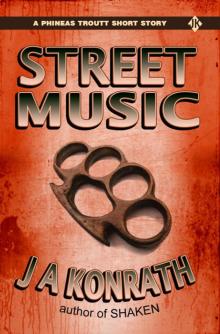 Street Music
Street Music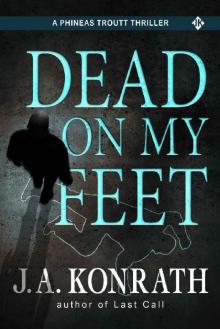 Dead on My Feet
Dead on My Feet What Happened To Lori - The Complete Epic (The Konrath Dark Thriller Collective Book 9)
What Happened To Lori - The Complete Epic (The Konrath Dark Thriller Collective Book 9)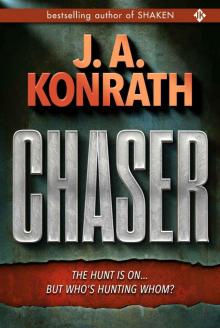 Chaser
Chaser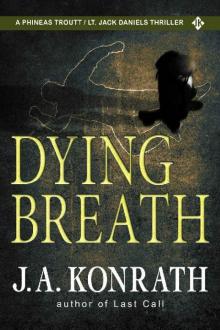 Dying Breath - A Thriller (Phineas Troutt Mysteries Book 2)
Dying Breath - A Thriller (Phineas Troutt Mysteries Book 2) Jack Daniels Six Pack
Jack Daniels Six Pack Jacked Up! (A Lt. Jack Daniels/Leah Ryan Mystery)
Jacked Up! (A Lt. Jack Daniels/Leah Ryan Mystery)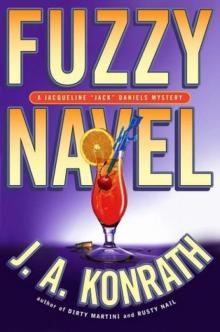 Fuzzy Navel
Fuzzy Navel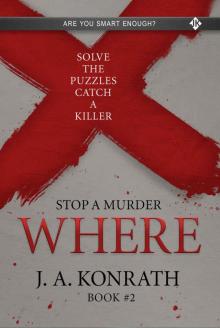 STOP A MURDER - WHERE (Mystery Puzzle Book 2)
STOP A MURDER - WHERE (Mystery Puzzle Book 2) Epitaph
Epitaph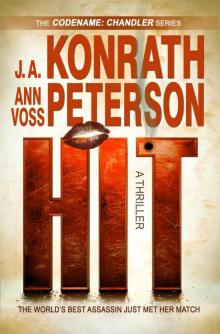 Hit: A Thriller (The Codename: Chandler)
Hit: A Thriller (The Codename: Chandler) Cheese Wrestling: A Lt. Jack Daniels/Chief Cole Clayton Thriller
Cheese Wrestling: A Lt. Jack Daniels/Chief Cole Clayton Thriller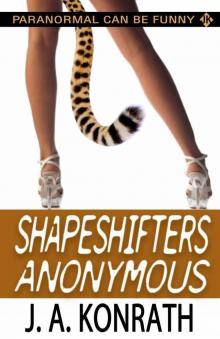 Shapeshifters Anonymous
Shapeshifters Anonymous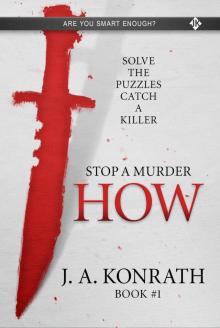 STOP A MURDER - HOW (Mystery Puzzle Book 1)
STOP A MURDER - HOW (Mystery Puzzle Book 1) Bloody Mary
Bloody Mary Dying Breath
Dying Breath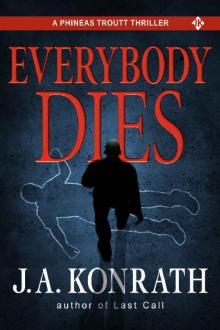 Everybody Dies - A Thriller (Phineas Troutt Mysteries Book 3)
Everybody Dies - A Thriller (Phineas Troutt Mysteries Book 3) DRACULAS (A Novel of Terror)
DRACULAS (A Novel of Terror) Shot of Tequila
Shot of Tequila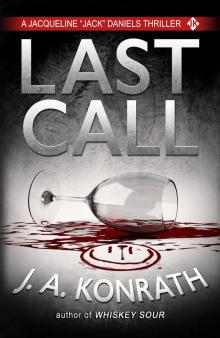 Last Call - A Thriller (Jacqueline Jack Daniels Mysteries Book 10)
Last Call - A Thriller (Jacqueline Jack Daniels Mysteries Book 10) Holes in the Ground
Holes in the Ground![Shaken [JD 07] Read online](http://i1.bookreadfree.com/i1/04/01/shaken_jd_07_preview.jpg) Shaken [JD 07]
Shaken [JD 07]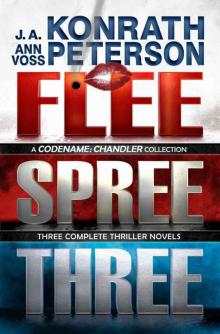 Flee, Spree, Three (Codename: Chandler Trilogy - Three Complete Novels)
Flee, Spree, Three (Codename: Chandler Trilogy - Three Complete Novels)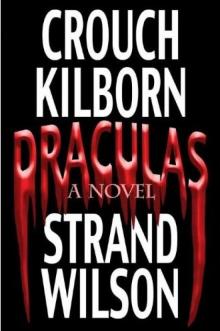 Draculas
Draculas Jack Daniels Stories
Jack Daniels Stories Wild Night is Calling
Wild Night is Calling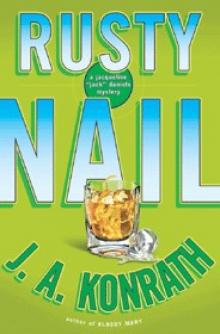 Rusty Nail
Rusty Nail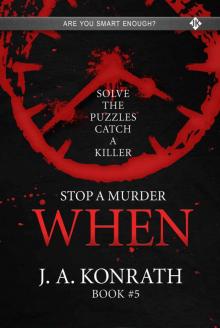 STOP A MURDER - WHEN (Mystery Puzzle Book 5)
STOP A MURDER - WHEN (Mystery Puzzle Book 5)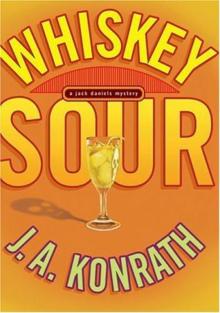 Whiskey Sour
Whiskey Sour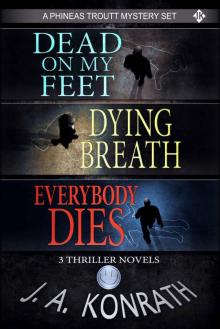 Phineas Troutt Series - Three Thriller Novels (Dead On My Feet #1, Dying Breath #2, Everybody Dies #3)
Phineas Troutt Series - Three Thriller Novels (Dead On My Feet #1, Dying Breath #2, Everybody Dies #3) Floaters - A Jack Daniels/Alex Chapa Mystery
Floaters - A Jack Daniels/Alex Chapa Mystery J.A. Konrath / Jack Kilborn Trilogy - Three Scary Thriller Novels (Origin, The List, Haunted House)
J.A. Konrath / Jack Kilborn Trilogy - Three Scary Thriller Novels (Origin, The List, Haunted House)![Shaken (Jacqueline Jack Daniels Mysteries) [Plus Bonus Content] Read online](http://i1.bookreadfree.com/i2/04/10/shaken_jacqueline_jack_daniels_mysteries_plus_bonus_content_preview.jpg) Shaken (Jacqueline Jack Daniels Mysteries) [Plus Bonus Content]
Shaken (Jacqueline Jack Daniels Mysteries) [Plus Bonus Content]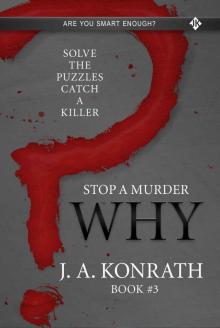 STOP A MURDER - WHY (Mystery Puzzle Book 3)
STOP A MURDER - WHY (Mystery Puzzle Book 3)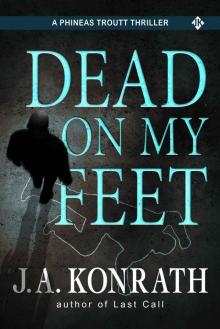 Dead On My Feet - A Thriller (Phineas Troutt Mysteries Book 1)
Dead On My Feet - A Thriller (Phineas Troutt Mysteries Book 1) Cherry Bomb
Cherry Bomb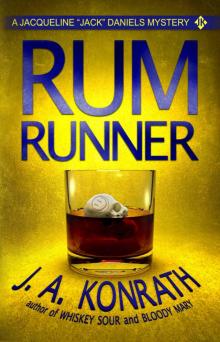 Rum Runner - A Thriller (Jacqueline Jack Daniels Mysteries Book 9)
Rum Runner - A Thriller (Jacqueline Jack Daniels Mysteries Book 9) With a Twist
With a Twist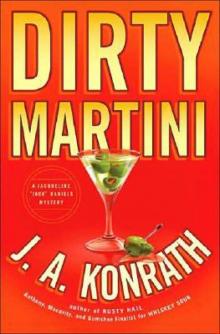 Dirty Martini
Dirty Martini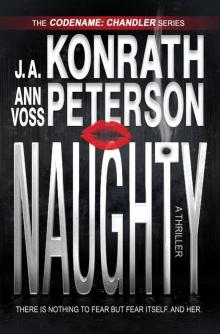 Naughty
Naughty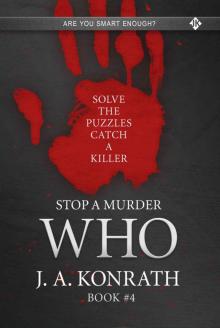 STOP A MURDER - WHO (Mystery Puzzle Book 4)
STOP A MURDER - WHO (Mystery Puzzle Book 4)